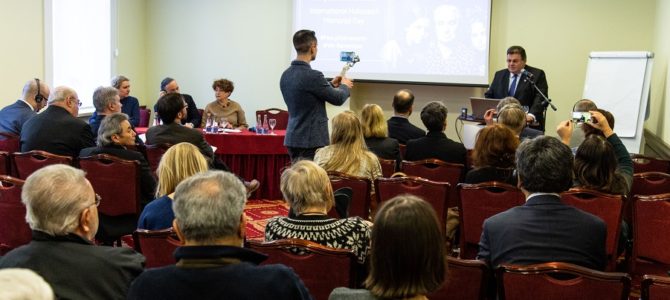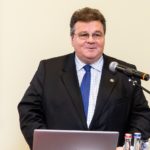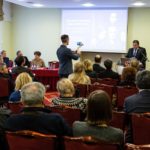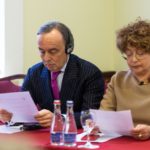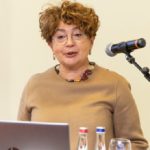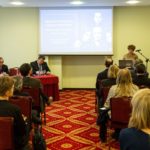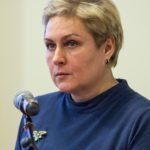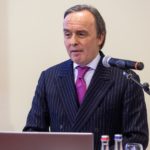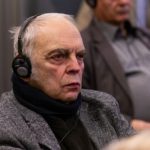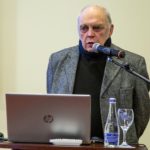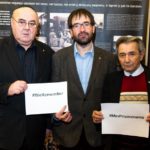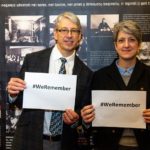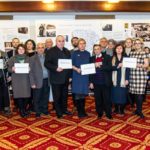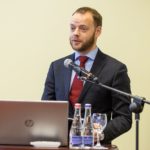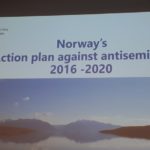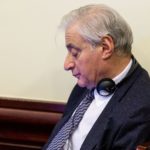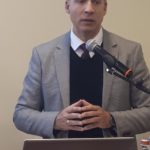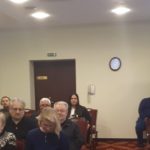The Lithuanian Jewish Community and the Lithuanian Department of Ethnic Minorities held a conference in Vilnius January 25 both to commemorate International Holocaust Remembrance Day and to look at new ways of fighting discrimination and anti-Semitism in Lithuania. Speakers included Vytautas Magnus University professors, members of the Lithuanian Government, diplomats and academics from abroad. The conference concluded with a presentation of the exhibit “Lithuania, Lite, Lita: One Century of Seven.”
Lithuania’s foreign minister Linas Linkevičius, Ethnic Minorities director Vida Montvydaitė and LJC chairwoman Faina Kukliansky gave welcome speeches.
Foreign minister Linkevičius spoke to the significance of Holocaust Remembrance Day: “Anti-semitism, discrimination against Jews, is a scar on my country. Making apologies will no longer help make anything better. Discrimination led to the Holocaust. Currently in Lithuania there are many signs for Jewish mass murder sites which we can visit and say: never again. We have to remember the Righteous Gentiles, of whom there are about 900 [from Lithuania]. Each year as we honor the victims who were murdered, we cannot guarantee that similar mass murders will not be repeated in the world. In order to stop this, Jewish history and the Holocaust must be part of educational curricula,” he said.
Lithuanian Jewish Community chairwoman Faina Kukliansky said: “There was anti-Semitism, there is anti-Semitism, and if we don’t fight it, there will be. Why can we not yet take down the statues and plaques commemorating Holocaust perpetrators, and why isn’t there even any discussion about property seized several times over? At least give back the property, if you can’t return the living, at least return that which all of Western Europe has. I have a request for our Government. In England, Germany, Norway and other countries there are events financed where Holocaust survivors participate; they are called victims of the Nazis. They could visit schools [in Lithuania] more often and tell about what really happened. I would be grateful if my request were passed on to the Government. Education isn’t just words, but also deeds, and we have to remember what happened.”
She continued: “In Norway, where many fewer Jews died, the state nonetheless has an 11-step program for fighting anti-Semitism. It was very significant to me to find out this sort of program exists and how it works. It wasn’t just Jews who were the victims of the Nazis, the Roma also died, and the Second World War left humanity with destroyed lives, shame and pain, and turned Lithuania into a graveyard. The Holocaust deprived us of a huge intellectual potential. The Righteous Gentiles gave people the gift of life, and so the virus of the Holocaust gave humanity a second chance. The international community only began to understand the value of the individual after all that pain was experienced, a value which became the first universal catalog of human rights, the Universal Declaration of Human Rights. Today we must still fight to have monuments to Nazi collaborators in Lithuania removed. We’ve already grown accustomed to the skinhead marches and their ‘Lithuania for Lithuanians.’ Sadly we now longer look at many things critically. The Shoah has marked us and obligated us forever. We don’t have the right to remain apathetic in the face of hate.
“Lithuania is one of the first states to adopt and approve the [IHRA] definition of anti-Semitism. It is just as important to the statesmen as it is to Jews. This definition demands of the state it protect us when there is a need to do so,” chairwoman Kukliansky said.
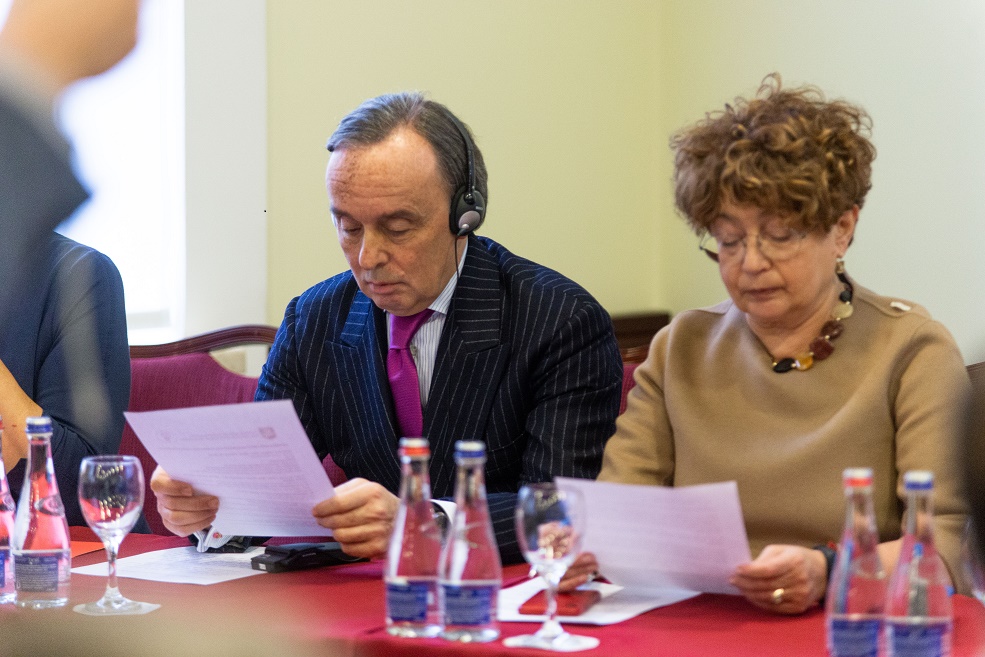
Hans Olav Syversen, secretary to Norwegian prime minister Erna Solberg, later presented at the conference the 11-point plan forged by the Norwegian parliament for fighting anti-Semitism. He spoke of the importance of trans-institutional cooperation in fighting discrimination.
Points in Norway’s Action Plan for Fighting Anti-Semitism
1. Current situation. 2. What is anti-Semitism? 3. The Jewish minority in Norway. The Holocaust in Norway. 4. Anti-Semitism prevention in schools. 5. Supporting initiatives to educate the public about the diversity of Jewish life and history in Norway. 6. Registration and investigation of anti-Semitic hate crimes. 7. Monitoring of public opinion. 8. Acquiring more information on anti-Semitism through academic research. 9. Insuring sufficient security measures for Jewish institutions. 10. Efforts to battle anti-Semitism outside Norway. 11. Main policies and legislation.
WJC special commissioner for fighting anti-Semitism Julius Meinl said Europe had to win the fight against anti-Semitism. He said Jews shouldn’t have to keep their suitcases packed in order to flee in case of danger. Meinl pointed out anti-Semitism is an equal-opportunity affliction and is found on the right as well as the left, and in radical Islam. The commissioner claimed anti-Semitism now takes the form of criticism of Israel. Jewish schools and synagogues need security in many different countries and many Jews in Europe and the United States have to hide their Jewishness in public because of the threat they face. Meanwhile, many anti-Semites don’t even think of themselves as such, and no longer adhere to the old line of hating Jews, but redirect that as hatred of the Jewish state. “If Europe has forgotten everything, it’s our responsibility to remind them,” Meinl said. He also said Jews must feel safe in the countries where they choose to live. Government must take measures and understand that it’s not just the Jewish communities under attack, but other ethnic communities as well, Meinl argued.
Lithuanian Department of Ethnic Minorities director Vida Montvydaitė said: “The Holocaust was one of the greatest tragedies in the history of Lithuania and the world. It is painful without end, but at the same time is a very important topic which we must talk about, no matter how difficult it is. We cannot and should not ignore expressions of hate encountered in society, among the public or even in the area of culture. Only long-term memory and a decision made by consensus to transmit and commemorate that memory can defuse the short-term short circuits of hatred.”
Dr. Linas Venclauskas of Vytautas Magnus University in Kaunas delivered a paper called “Atrophy of Emotions: Anti-Semites of Interwar Lithuania on the Zionist Movement in Lithuania.”
Dr. Algimantas Kasparavičius of the Lithuanian History Institute spoke on his topic “Jews, the Holocaust and the Anti-Soviet Resistance: Special Features of the Historical Memory of Ethnic Lithuanians in the Second Republic.”
Special Holocaust envoy of the Greek Foreign Ministry Dr. Photini Tomai-Constantopoulou delivered a speech and spoke during the discussion following presentations said history needs to be remembered, but discrimination in the world today and modern society’s fight against anti-Semitism also need to be discussed. She said there is no lack of problems today. She also asked whether there are Jews in state service, in the Foreign Ministry and working as diplomats in Lithuania today. She asked if the answer was no, did that mean there was discrimination against Jews in Lithuania?
The mobile exhibit “Lithuania, Lite, Lita. One Century out of Seven” sponsored by the Lithuanian Foreign Ministry and the Lithuanian Jewish Community and designed by Victoria Sideraitė-Alon and Jūratė Juozėnienė of the JUDVI design studio was presented at the conference by exhibit author Pranas Morkus. The exhibit features Lithuanian-Jewish relations and famous Litvaks, including the Vilna Gaon.
Photos by Laima Penek


